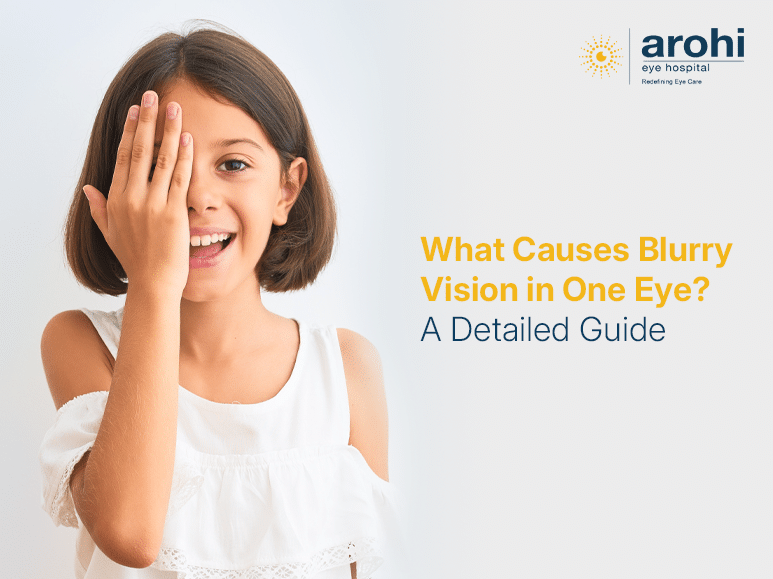The blurry vision in one eye can be pretty disturbing and might affect your daily activities, such as reading and driving, and even while working. There is no definition of age for this development, and it might just pop up suddenly or over a period of time. In some cases, the development of this condition leads to some serious issues with the eyes. Knowing their causes and treatment in advance helps you in preventing blurry vision in one eye. In this guide, we will discuss some of the most common and serious causes of blurred vision in one eye, their treatments, and prevention methods for proper eye care.
A] Common Causes of Blurry Vision in One Eye
1. Eye Infection
This is an infection like conjunctivitis or keratitis that causes inflammation, redness, and blurry vision in one eye. Such infections can also end up coming from bacterial, viral, or fungal sources and might cause discomfort and discharge.
2. Eye Injury
Physical trauma in the eye can damage a person’s cornea or retina, causing blurry vision. Corneal abrasions are common injuries that result from scratches, although sometimes blunt force trauma can have temporary or permanent effects on visions.
3. Eye Strain
Digital screen exposure for prolonged periods or reading without stopping can cause eye pressure. Symptoms include blurred vision, complications, and dry eyes on one eye more than the other.
4. Refractive Error
Digital screen exposure for prolonged periods or reading without stopping can cause eye pressure. Symptoms include blurred vision, complications, and dry eyes on one eye more than the other.
5. Dry Eye Syndrome
Dry eye syndrome is a condition wherein your eyes don’t produce sufficient tears or produce poor-quality tears. This results in discomfort and might affect vision. It’s not a common condition and could impact any age of human beings. Treatment focuses on improving tear production or quality and alleviating discomfort.
B] Some Serious Conditions that May Cause Of Blurry Vision In One Eye
1. Glaucoma
Glaucoma is due to increased intraocular pressure in which the optic nerve starts damaging and causes loss in vision gradually. Glaucoma usually affects both the eyes, in the early stages possibly causing blurry vision in one eye. For expert care, discover Glaucoma Treatment in Mumbai.
Key Symptoms: Gradual vision loss, halos around lights.
Recommended Treatment: Eye drops, laser treatment, or surgery.
2. Retinal Detachment
It is a detachment of the light-sensitive retina from the back of the eye. This results in loss of vision as it interrupts the transmission of visual signals to the brain. Emergency surgical intervention is needed to reattach the retina and prevent permanent vision loss. Various techniques of surgery are used, and the surgery is performed according to the type and severity of the detachment.
Key Symptoms: Blurry vision, flashes of light, shadowed vision.
Recommended Treatment: Immediate surgical intervention.
3. Cataract
A cataract is a condition in which the natural lens of an eye becomes cloudy, blurring and hazing vision. It develops gradually due to ageing but could also develop due to injury, any medical condition, or continuous ultraviolet exposure. It can affect one or both eyes; however, it can be treated with surgery that replaces the clouded lens with a clear synthetic one. It is recommended to have Cataract treatment under the guidance of an expert surgeon.
Key Symptoms: Cloudy or blurry vision, sensitivity to light.
Recommended Treatment: Cataract surgery in Mumbai.
4. Brain Tumour
A brain tumour is an abnormal increase of cells within the brain. These growths can be benign (non-cancerous) or malignant (cancerous). Treatment options range depending on the type, area, and size of the tumour. Most (77.8%) of our patients mentioned headache at presentation. This is a known symptom that appears in 43% to 99% of patients with brain tumours. Early diagnosis and suitable management are important for the most useful results.
Key Symptoms: Headaches, nausea, balance issues, and possible vision loss.
Recommended Treatment: Surgical removal, radiation therapy, chemotherapy, or targeted therapies.
5. Age-related Macular Degeneration (AMD)
Age-related macular degeneration (AMD) damages the macula, the part of the eye required for sharp vision. This consequently causes vision loss in older adults by producing blurry or distorted visions and, subsequently, blindness. Treatments focus on slowing or stopping AMD’s development.
Key Symptoms: Blurred central vision, difficulty reading.
Recommended Treatment: Injections, lifestyle adjustments.
6. Diabetic Retinopathy
Diabetic retinopathy is a complication of diabetes that affects the blood vessels of the retina. It is one of the main causes of blurry vision among working-age adults. If it is not treated early, the condition may damage the retina, leading to vision loss or blindness. Regular eye checkups are important for the early detection and management of diabetic retinopathy.
Key Symptoms: Blurred vision, floaters, difficulty seeing colours.
Recommended Treatment: Diabetes management, laser therapy.
C] Treatment Options Available for Blurry Vision in One Eye
- Corrective Lenses: Refractive errors like myopia or hyperopia can be handled with prescription glasses or contact lenses.
- Medications: Antibiotics, antivirals, or anti-inflammatory eye drops can be used to treat infections and irritation.
- Surgical Interventions: These conditions may need surgical intervention to treat them effectively, examples include cataracts, retinal detachment, and advanced glaucoma.
- Lifestyle Changes: Reducing screen time, use of appropriate lighting, and exercising the 20-20-20 rule can also ease eye pressure.
- Specialised Care: Such conditions as glaucoma and diabetic retinopathy require consulting professional experts for appropriate targeted treatment.
Conclusion
The causes of blurry vision in one eye range from minor conditions like dry eyes to more serious conditions such as retinal detachment or glaucoma. Early diagnosis and treatment are essential to avoid blurry vision in one eye. One should look for the earliest possible appointment with an eye specialist if they have persisting blurry vision. Start your journey to better vision today by exploring expert services like cataract, glaucoma, and retina treatment in Mumbai.
FAQs
1. What causes sudden blurry vision in one eye?
Sudden blurry vision can result from retinal detachment, an eye stroke, or acute glaucoma. Immediate medical attention is essential.
2. How do you fix one blurry eye?
The treatment totally relies on the causes, it could range from corrective lenses to medicines or surgical operations.
3. Do I need glasses if one eye is blurry?
If a refractive error is the cause, prescription glasses could be helpful to correct the issue.
4. How to fix blurry vision naturally?
Natural remedies include staying hydrated, restricting screen time, and healthy diet-rich food with nutrients such as omega-3 fatty acids and vitamin A.
5. Is blurry vision in one eye a sign of a serious condition?
Yes, it can even lead to serious issues such as retinal detachment, glaucoma, or a brain tumour. It needs a correct diagnosis from an expert.
6. When should I see a doctor about blurry vision in one eye?
If blurry vision persists, worsens, or is accompanied by different signs and symptoms like pain or flashes of light, consult a specialist right now.
7. Is blurry vision in one eye reversible?
In many cases, it’s reversible with proper treatment, which includes addressing refractive errors or treating underlying medical conditions.
Dr. Shradha Goel
Dr. Shradha Goel, Chief Surgeon at Arohi Eye Hospital, is a renowned Phaco-LASIK surgeon with over 10,000 surgeries to her credit. She earned her MBBS from Grant Medical College, Mumbai, and a Master’s in Ophthalmology from Kasturba Medical College, Manipal. As a member of the American Academy of Ophthalmology, Dr. Goel specialises in LASIK, refractive errors, and cataract treatments.


